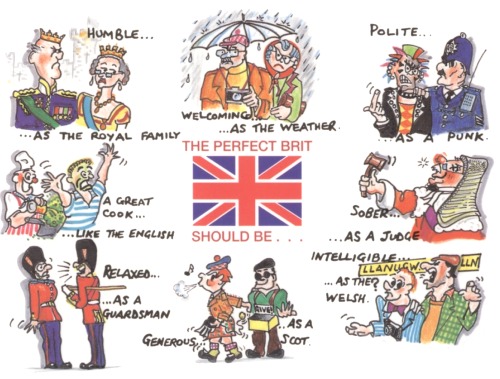
WS 2011/2012 exam translation text 00
Britain
Britain is a
land of very mixed and varied racial origins and composition, and this is particularly true of England proper. Mediterranean, Celtic,
Roman, German and Scandinavian are the basic,
long-term elements that have combined and contributed to form the character of the people which is more
complex than is often realized, especially by those with a passion for
generalization and over-simplification, with an eye for the “typical”
this and that rather than for the individual. If we like to make a broad twofold
distinction between the Anglo-Saxon (Germanic, non-Celtic) sphere of influence,
on the one hand, and the Celtic on the other, we can no doubt find essential
traits of mind and character prominent in each. We may venture the
generalization that the non-Celts tend to be cautious, reserved and practical in
temperament and approach, guided in the first place by fact rather than by
theory, of a solid, even slow intelligence rather
than quick-witted or highly imaginative, with ideals such as the notorious “common
sense”, balance, tolerance and moderation. The Celt, on the other hand, while
not lacking in the qualities just enumerated, is more open and impulsive, of a
vivid and fanciful imagination, nimble-witted and quick in the uptake, a lover
of talk and of eloquence, of colour and ornament. There is truth
in this very broad distinction and we may pursue it a little further.
As important as the distinction is,
of course, the fact that the two types, if we can so call them, blend and merge, probably throughout the British Isles
in some degree but with particular and often disconcerting subtlety in
England itself — a mixture usually well-balanced, but a mixture. Perhaps the
best way to try to understand that phenomenon, the “Englishman” — still,
it seems, for many an exasperating task — is to be prepared to find and accept
a blend of contrasts rather than try to
apply any single preconceived idea or standard.
from:
John Bourke, Britain. A Short Introduction for Students of English, p. 12
(Hueber Hochschulreihe 3, 1971)
"The perfect Brit":

back to exam translation WS 2011/2012, index back to homepage
THE BOTTOM LINE THE BOTTOM LINE THE BOTTOM LINE THE BOTTOM LINE THE BOTTOM LINE THE BOTTOM LINE